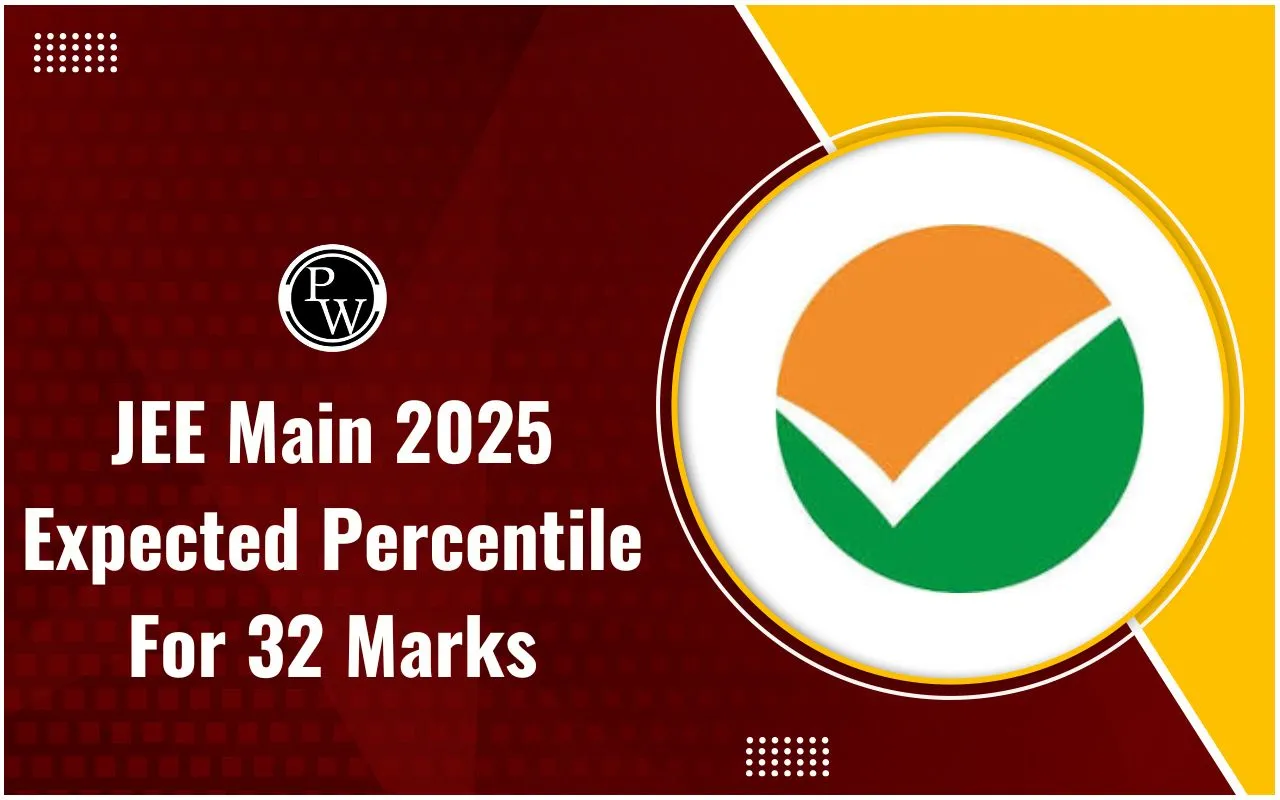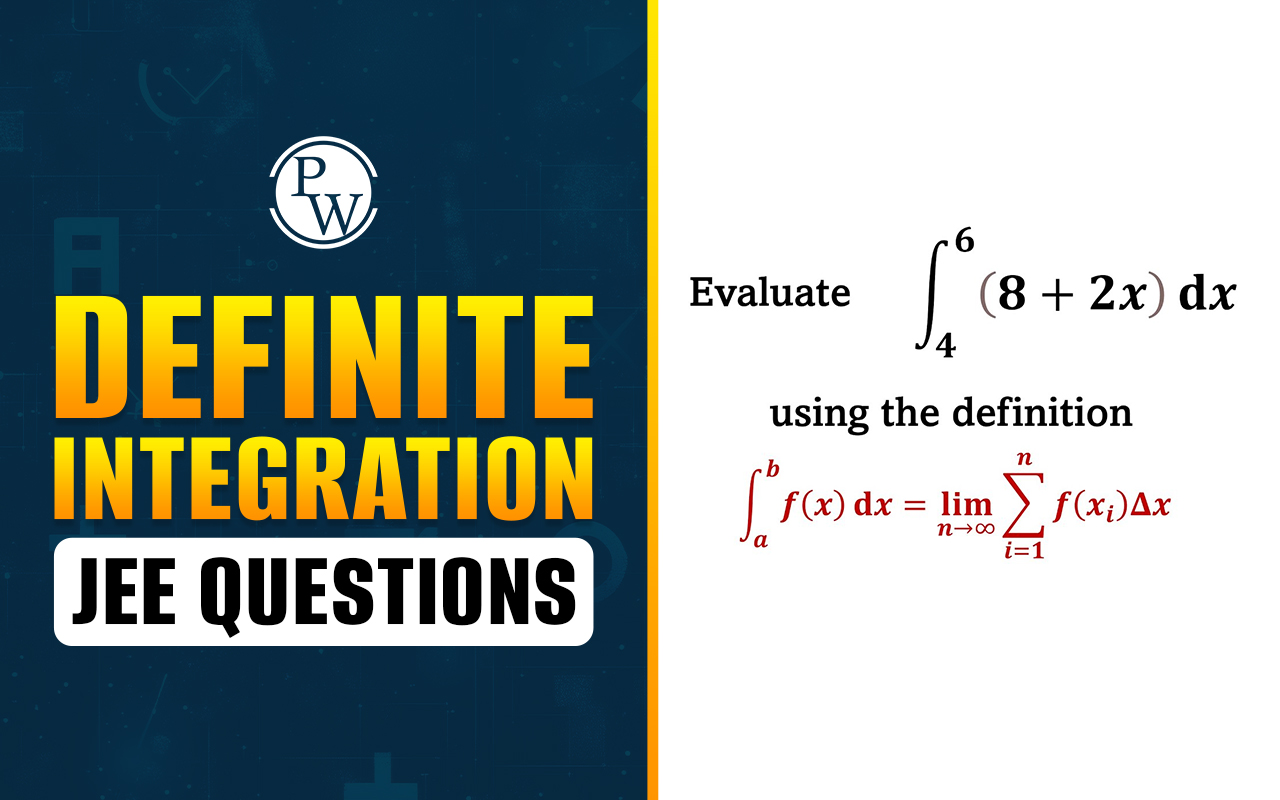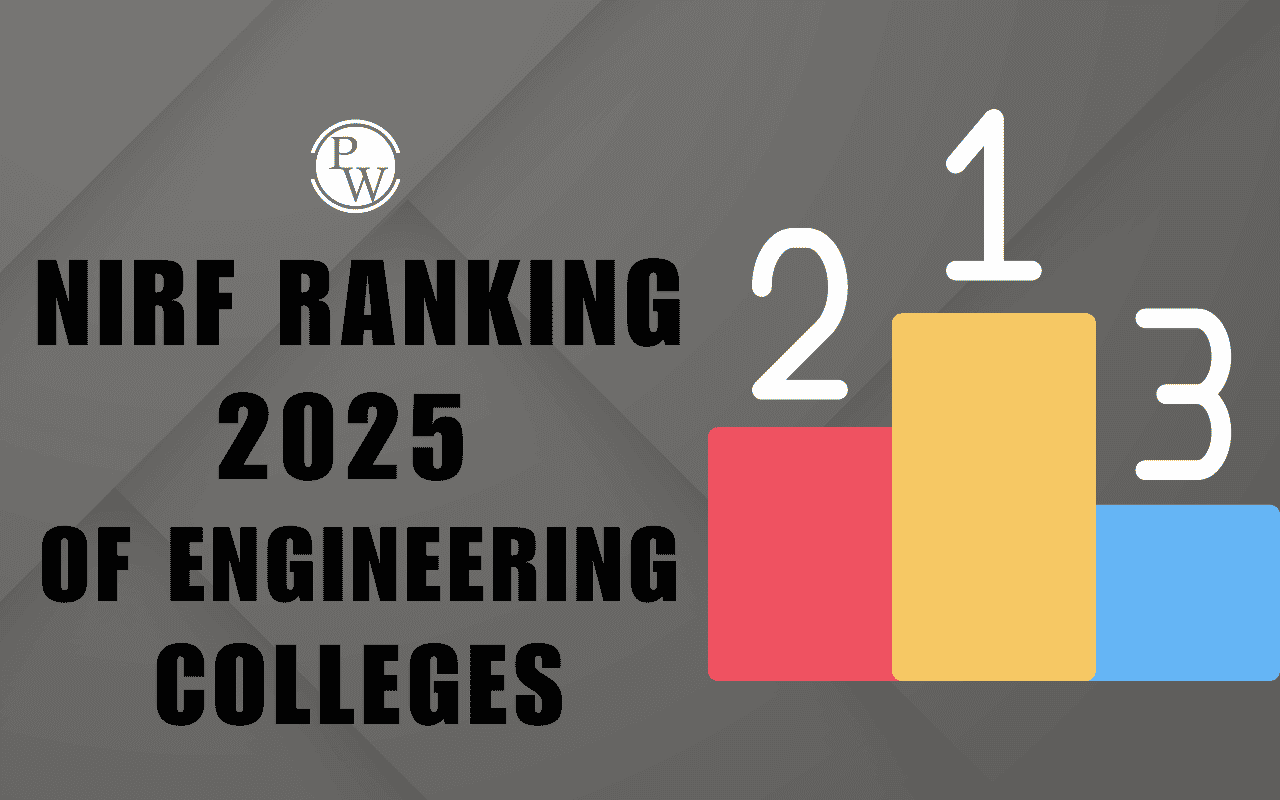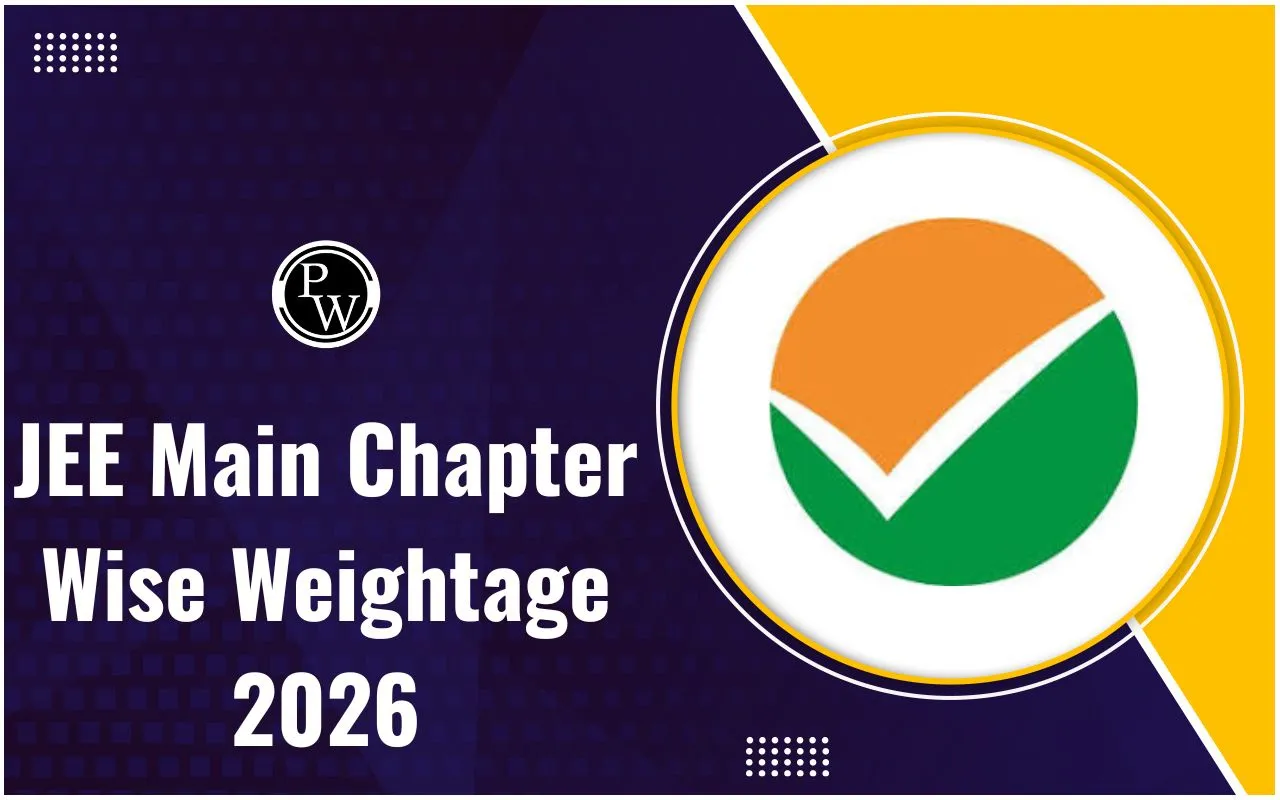
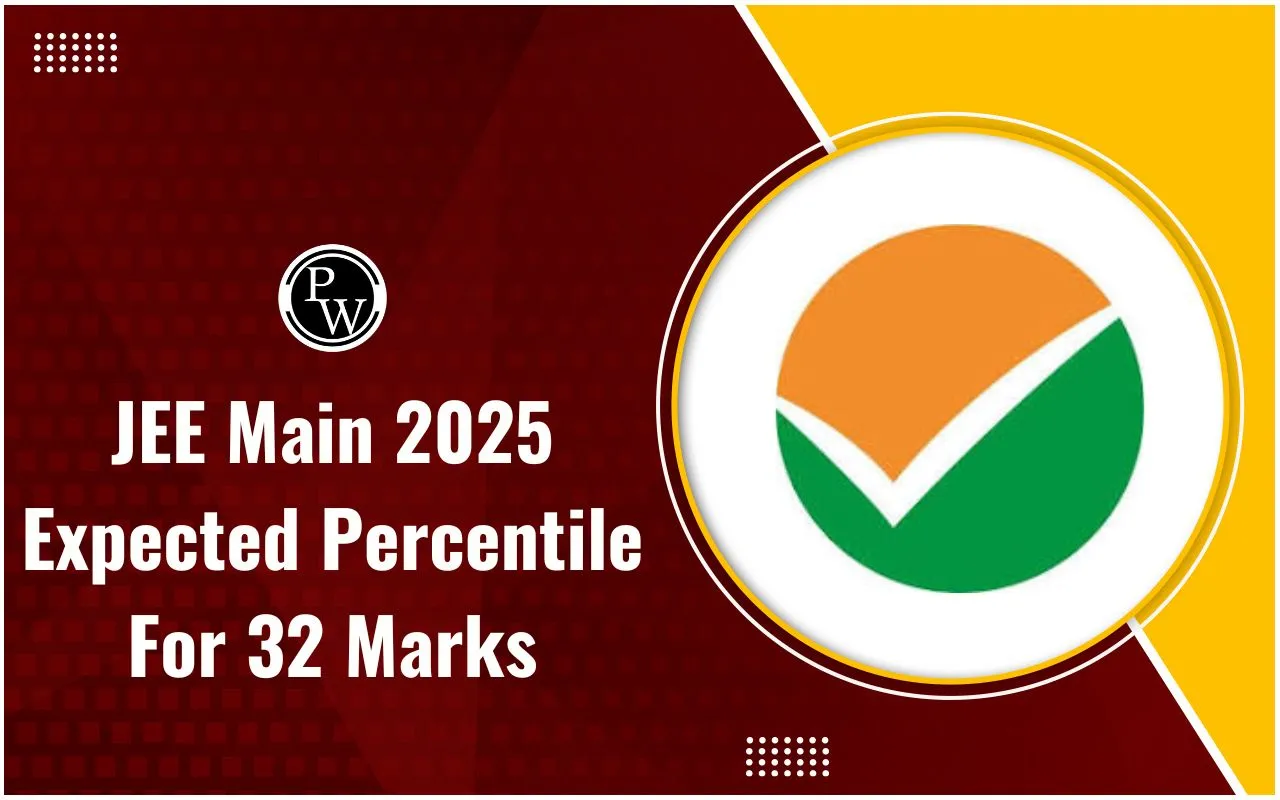
JEE Main 2025 Expected Percentile for 32 Marks : The National Testing Agency (NTA) has released the final answer key for JEE Main 2025 Session 1 on its official website. Many aspirants are now eager to know how their marks translate into percentiles and ranks. For those scoring 32 marks in JEE Main 2025, understanding the expected percentile and rank is important for planning the next steps. Based on previous trends, 32 marks in JEE Main are expected to result in a 68 percentile. To learn more about JEE Main 2025 expected percentile for 32 marks, keep reading.
JEE Main 2025 Percentile for 32 Marks
While looking at previous years' trend, 32 marks in the JEE Main examination are expected to lead to a percentile of around 68. This percentile is considered to be quite low, especially for general category applicants, making it challenging to secure a seat through JoSAA counselling. However, admission is still possible in some private engineering colleges and through other counselling processes. The exact percentile for 32 marks in JEE Main 2025 will be confirmed once the official results are declared. Generally, a safe score for admission to most participating institutions falls between 175 and 185 marks. Keep reading to learn more about the JEE Main 2025 percentile for 32 marks and possible admission options.
What Does 32 Marks in JEE Main 2025 Percentile Mean?
As previously stated, scoring 32 marks in JEE Main 2025 is considered a low score, and it may not be enough to secure admission in top engineering colleges. To have a better chance at admission, applicants must aim for a score above 170 marks. The percentile score in JEE Main is calculated based on the performance of all applicants in the exam. For 32 marks, the expected percentile is going to range from 66.66 to 69.57. This means that an applicant scoring 32 marks has performed better than around 66 to 69% of the total test-takers. However, since admissions are highly competitive, a higher score is usually required for securing a good rank. Checking the JEE Main marks vs. percentile trend as outlined below can help applicants understand how their marks translate into percentile and rank.
Expected JEE Main 2025 Marks vs. Percentile
The percentile score in JEE Main is determined based on the applicant's performance relative to others. Higher marks result in a better percentile, increasing the chances of securing admission to top engineering colleges. For the ease of applicants understanding, here are the details of the expected JEE Main 2025 marks vs. percentile:
-
Students scoring between 175 and 290 marks in JEE Main 2025 can expect a percentile ranging from 99.02 to 99.34, which is considered a high score for admission to top engineering colleges.
-
Those securing 161 to 174 marks can achieve a percentile between 98.52 and 98.99, while applicants with 149 to 160 marks are likely to fall within the 98.07 to 98.49 percentile range.
-
A score between 132 and 148 marks is expected to result in a percentile between 97.01 and 97.97, whereas applicants scoring 120 to 130 marks might obtain a percentile between 96.06 and 96.93.
-
Those with 110 to 119 marks can expect a percentile from 95.05 to 95.98, while a score of 102 to 109 marks may lead to a percentile between 94.01 and 94.96.
-
For applicants scoring 95 to 101 marks, the expected percentile is 93.05 to 93.89, while those with 89 to 94 marks may achieve a percentile between 92.05 and 92.88.
-
A score in the range of 79 to 88 marks is likely to result in a percentile between 90.04 and 91.79.
-
Aspirants securing 62 to 87 marks may fall within the 85.56-91.59 percentile range, while those scoring 41 to 61 marks can expect a percentile between 70.26 and 84.22.
-
Applicants with 1 to 40 marks are likely to obtain a percentile ranging from 66.65 to 69.57, which is considered a low score in the exam.
Applicants with scores above 175 marks can expect a 99+ percentile, which is considered a strong score for admission to top institutions. On the other hand, scores below 40 marks generally result in a low percentile, making admission to premier colleges difficult. Understanding the JEE Main 2025 marks vs. percentile trend helps aspirants set realistic goals and work towards improving their scores in upcoming attempts.
Is 32 Marks in JEE Main 2025 a Good Score?
Scoring 32 marks in JEE Main 2025 is considered a low score, as it is expected to result in a percentile between 66.65 and 69.57. With this percentile, securing admission to NITs, IIITs, or other top engineering colleges through JoSAA counselling is highly unlikely, especially for general category candidates.
Students aiming for admission to reputed institutions should target a higher score, preferably above 170 marks, to achieve a competitive percentile. However, applicants with 32 marks in JEE Main 2025 can still explore private engineering colleges or state-level counseling options that accept lower scores.
Expected NITs Accepting Low JEE Main 2025 Scores
Securing a rank above 70,000 in JEE Main 2025 may limit admission opportunities in top-tier NITs. However, some National Institutes of Technology (NITs) offer B.Tech seats to students with lower ranks. The specific cut-off ranks for NIT admissions vary yearly based on factors such as the number of applicants, exam difficulty, and seat availability.
Despite a lower rank, students can still secure admission to reputed NITs, provided they are aware of the institutes with lower cut-offs. Understanding past trends can help in making informed choices regarding college and course preferences. Here are some NITs that have previously admitted students with lower JEE Main ranks:
-
NIT Jalandhar offered admission in Biotechnology, with a closing rank of 83,326.
-
NIT Agartala provided seats in Biotechnology & Biochemical Engineering, with a closing rank of 287,950.
-
NIT Goa accepted students for Civil Engineering, with a closing rank of 114,874.
-
NIT Hamirpur granted admission in Materials Science & Engineering, with a closing rank of 101,344.
-
NIT Meghalaya had a closing rank of 142,261 for Civil Engineering.
-
NIT Puducherry admitted students in Civil Engineering, with a closing rank of 225,349.
-
NIT Raipur provided seats in Biotechnology, with a closing rank of 88,031.
-
NIT Sikkim accepted students for Electrical & Electronics Engineering, with a closing rank of 639,272.
-
NIT Arunachal Pradesh had a closing rank of 136,432 for Computer Science & Engineering.
-
NIT Manipur admitted students in Civil Engineering, with a closing rank of 229,695.
-
NIT Mizoram provided seats in Civil Engineering, with a closing rank of 678,406.
-
NIT Srinagar accepted students for Chemical Engineering, with a closing rank of 107,655.
It is important to note that these cut-offs may change yearly based on factors such as exam difficulty, the number of applicants, and seat availability. Students with lower JEE Main 2025 ranks can explore these institutes for potential admission opportunities.
Expected IIITs Accepting Low JEE Main 2025 Scores
Securing admission to an Indian Institute of Information Technology (IIIT) with a JEE Main rank above 30,000 may seem challenging, but it is still possible. Some IIITs have previously offered seats to students with relatively lower ranks, depending on factors such as seat availability and category-wise reservations.
Students aiming for admission should explore institutes that have accepted students with lower ranks in past years. Understanding previous admission cut-off trends can help in identifying IIITs where admission may still be achievable despite a lower JEE Main 2025 score.
-
IIIT Kota offered admission in Electronics and Communication Engineering (female-only), with a closing rank of 33,828.
-
IIIT Guwahati provided seats in Electronics and Communication Engineering (female-only), with a closing rank of 35,265.
-
IIIT Kalyani admitted students in Electronics and Communication Engineering (gender-neutral), with a closing rank of 41,775.
-
IIIT Una granted admission in Electronics and Communication Engineering (female-only), with a closing rank of 34,570.
-
IIIT Chittoor offered seats in Electronics and Communication Engineering (female-only), with a closing rank of 35,012.
-
IIITDM Kancheepuram accepted students for Mechanical Engineering (Gender-Neutral), with a closing rank of 46,172.
-
IIITDM Jabalpur provided admission in Mechanical Engineering (Gender-Neutral), with a closing rank of 42,814.
-
IIIT Manipur offered seats in Computer Science and Engineering (female-only), with a closing rank of 50,763.
-
IIIT Tiruchirappalli admitted students in Electronics and Communication Engineering (female-only), with a closing rank of 40,183.
-
IIIT Dharwad granted admission in Data Science and Artificial Intelligence (gender-neutral), with a closing rank of 37,258.
-
IIITDM Kurnool provided seats in Artificial Intelligence and Data Science (gender-neutral), with a closing rank of 37,820.
-
IIIT Kottayam offered admission in Computer Science and Engineering (Cyber Security specialization) (female-only), with a closing rank of 37,056.
-
IIIT Ranchi admitted candidates in Electronics and Communication Engineering (gender-neutral), with a closing rank of 40,510.
-
IIIT Nagpur provided admission in Electronics and Communication Engineering (Internet of Things specialization) (gender-neutral), with a closing rank of 36,175.
-
IIIT Bhagalpur offered seats in Computer Science and Engineering (female-only), with a closing rank of 41,557.
-
IIIT Surat granted admission in Electronics and Communication Engineering (female-only), with a closing rank of 33,774.
-
IIIT Agartala accepted candidates for Computer Science and Engineering (female-only), with a closing rank of 42,856.
-
IIIT Raichur provided seats in Artificial Intelligence and Data Science (female-only), with a closing rank of 40,104.
-
IIIT Vadodara offered admission in Computer Science and Engineering (female-only), with a closing rank of 37,074.
JEE Main 2025 Expected Percentile For 32 Marks FAQs
Q.1 : What is the expected percentile for 32 marks in JEE Main 2025?
Q.2 : Can 32 marks in JEE Main 2025 secure admission in NITs or IIITs?
Q. 3 : How is the percentile calculated for JEE Main?
Q.4 : Does the JEE Main 2025 percentile change after each session?

